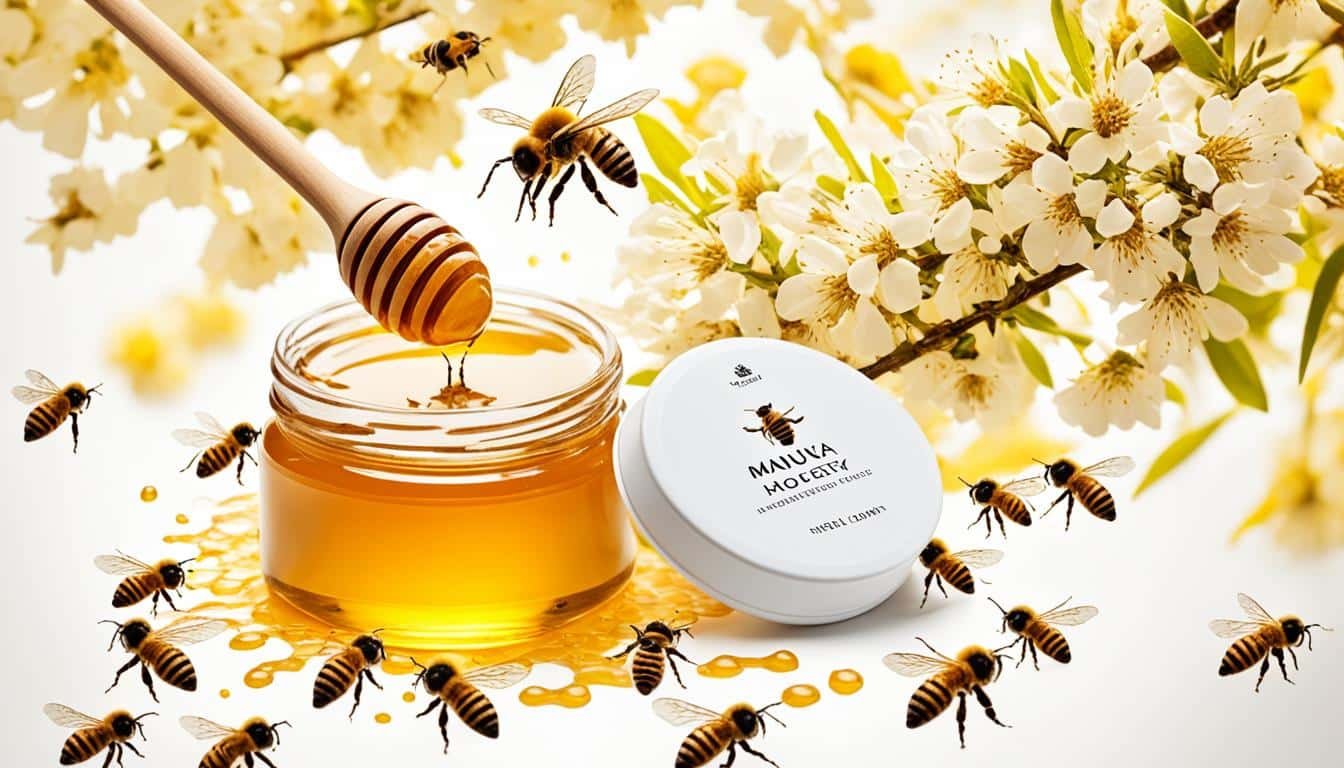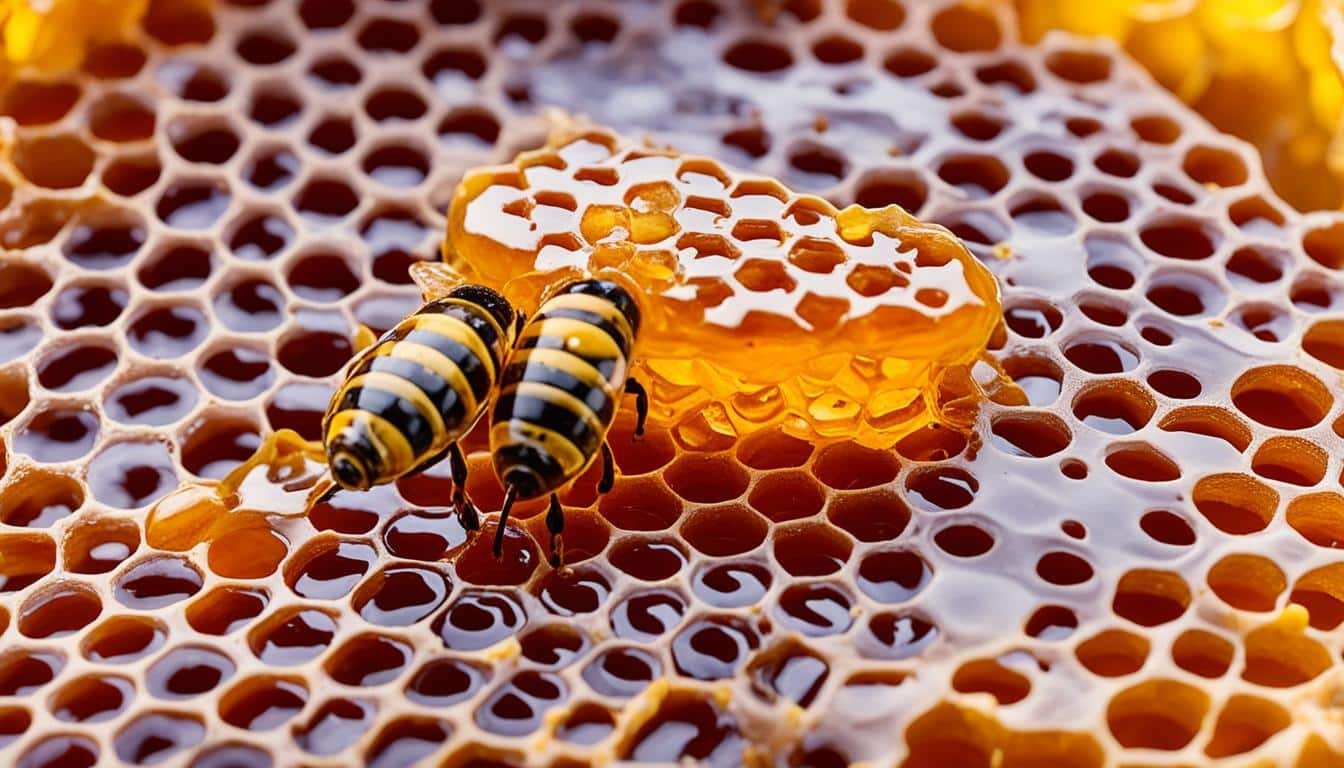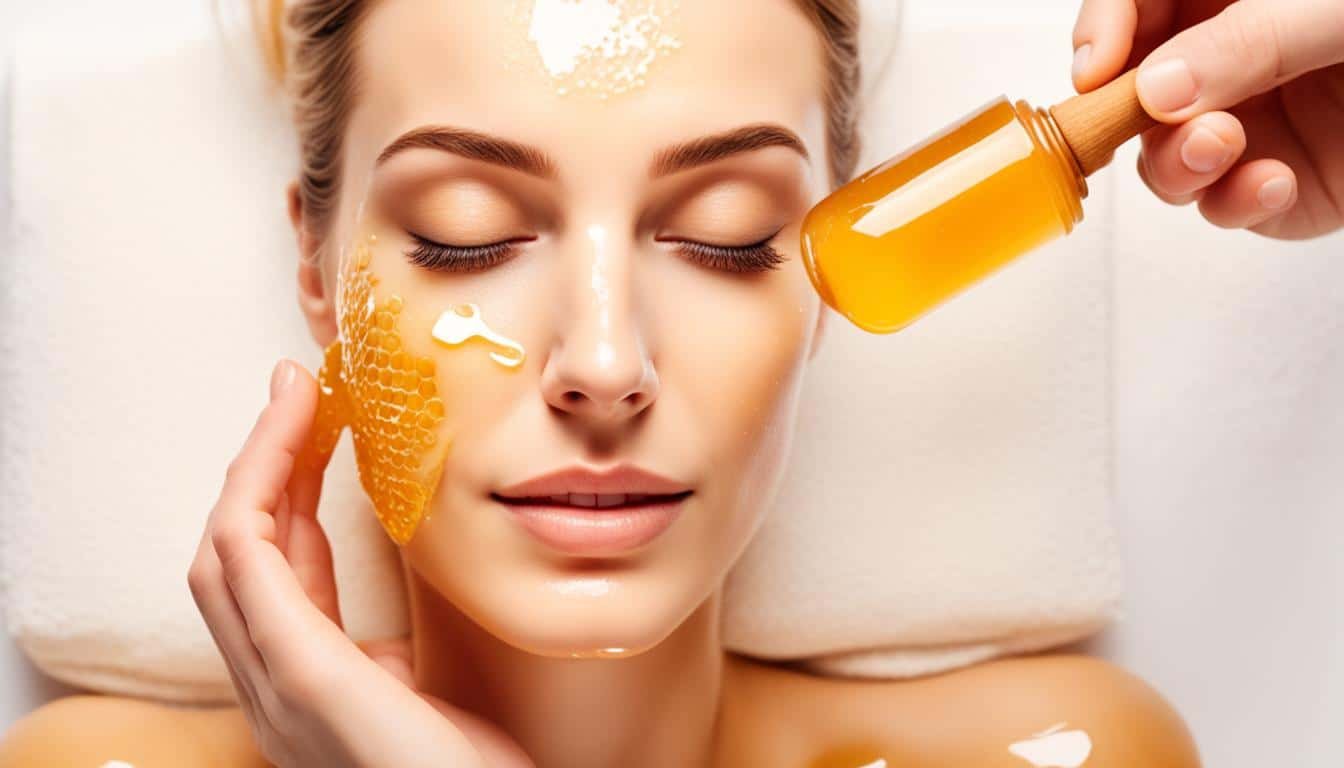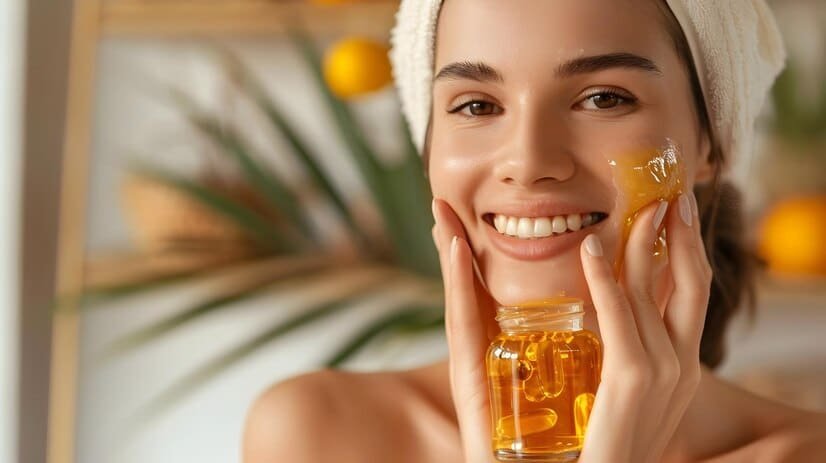Raw honey can do wonders for your skin. It fights bacteria, exfoliates, and helps heal wounds faster. Bees make honey, a sweet, sticky liquid. It’s made from enzymes, plants, and live bacteria, making it a powerful ingredient.
This process makes honey great for beauty uses. It can clear acne, heal scars, and even skin tone. Using raw, unpasteurized honey is best for your skin.
You can use honey in DIY treatments to make your skin glow. It nourishes, hydrates, and rejuvenates your skin.
Key Takeaways
- Raw, unprocessed honey has numerous benefits for the skin when used in DIY treatments.
- Honey’s natural antimicrobial and anti-inflammatory properties can help treat acne, eczema, and other skin conditions.
- Honey can speed up the skin’s healing process and fade scars or discoloration.
- Using honey in homemade face masks, scrubs, and spot treatments can nourish, hydrate, and brighten the complexion.
- Combining honey with other natural ingredients like yogurt, papaya, and egg whites can create effective DIY skin care solutions.
Introduction to Honey’s Skin Benefits
Honey has been a key ingredient in skincare and traditional medicine for centuries. It’s a golden liquid that’s full of benefits for the skin. It’s great for DIY skin treatments and commercial products too. Honey can nourish and hydrate the skin and fight off germs and inflammation. It’s a true skin rejuvenator that can make your skin look healthy and glowing.
Raw Honey and Its Natural Composition
Raw honey is the best form of honey for skin care. It’s full of natural sugars, enzymes, antioxidants, and beneficial bacteria. These ingredients help it work as a strong humectant and antimicrobial. Raw honey keeps these important parts that help with skin care and managing different skin types.
Honey’s Production Process and Unique Properties
The way honey is made is complex and involves bee enzymes, plant matter, and live bacteria. This process gives honey its special viscosity, flavor, and aroma. It also makes it a strong antimicrobial, anti-inflammatory, antiviral, and antifungal agent. These qualities make raw honey a top choice for DIY skin care and skin rejuvenation treatments.
“Honey has been used in traditional medicine for centuries to treat various skin conditions, and modern research continues to uncover its remarkable benefits for the skin.”
Antimicrobial and Anti-Inflammatory Properties

Honey is known for its amazing benefits for the skin. It fights bacteria and fungi, making it great for acne. This natural remedy helps control the bacteria that cause breakouts.
Honey also soothes skin conditions like eczema and psoriasis. Its antibacterial and anti-inflammatory effects help wounds and burns heal faster. Studies show manuka honey is a top choice for treating many skin issues.
Honey’s Ability to Kill Bacteria and Fungi
Manuka honey is a strong fighter against acne-causing bacteria and fungal infections. Research shows it can stop many harmful microorganisms. This includes Staphylococcus aureus, Escherichia coli, and Candida albicans.
Soothing Effects on Skin Conditions like Eczema
Honey’s anti-inflammatory properties ease skin issues like eczema and psoriasis. It reduces redness, itching, and discomfort. This makes honey a natural choice over traditional treatments.
“Honey has been used for centuries as a natural remedy for a variety of skin conditions due to its unique properties. Its antimicrobial and anti-inflammatory effects make it a valuable addition to any skincare routine.”
Acne Treatment with Honey
Honey is a strong natural remedy for acne. It has antimicrobial and anti-fungal properties. These help tackle the causes of breakouts. Honey cleans pores by removing dirt, oil, and bacteria, preventing acne before it starts.
Honey can also be used directly on blemishes. Apply raw, unpasteurized honey to the area. It helps the skin heal and reduces the look of breakouts.
Honey’s Effectiveness Against Acne Compared to Other Products
Studies show that manuka honey is better than antibacterial soap for acne. It kills bacteria and fungi that cause acne. This makes honey a strong natural choice instead of traditional acne products.
“Honey’s unique composition and antimicrobial properties make it a powerful tool for treating acne and promoting healthier skin.”
Honey is gentler than over-the-counter treatments, great for sensitive skin. It combines antibacterial and anti-inflammatory effects. This helps cleanse pores, treat breakouts, and fade blemishes safely.
Wound Healing and Scar Fading

Honey has been known for its amazing healing powers for the skin. It has a bit of hydrogen peroxide, which can lighten the skin and fade scars and marks. This makes it great for acne scars and other scars.
Honey is also great for speeding up wound healing. Studies show that manuka honey can make wounds heal faster. It helps repair and grow new skin cells.
Honey’s Wound-Healing Superpowers
Honey’s healing power comes from its special mix. It fights off infections and reduces swelling. Honey also has enzymes and antioxidants that help new skin cells grow faster.
This can be really helpful for eczema. It helps fix the skin’s barrier and reduces irritation. Honey supports the skin’s natural healing, which can lessen eczema flare-ups and scars.
Though not much research has been done, honey might help fade post-acne marks and scars. Its mild lightening effect and skin repair abilities make it a good choice for those wanting to hide scars.
“Honey’s remarkable wound-healing properties make it a versatile and natural solution for a variety of skin concerns, from scarring to eczema.”
Exfoliation and Skin Brightening

Honey is a great addition to your skincare routine. It’s a natural way to exfoliate and brighten your skin. It helps remove dead, dull skin cells to show off radiant, even-toned skin.
Honey’s gentle exfoliating properties remove dead skin cells. This leaves your skin feeling soft, smooth, and refreshed. It’s not as harsh as some exfoliators but still works well to remove dry, flaky skin. This action unclogs pores and makes your skin glow evenly.
Manuka honey is especially good for brightening the skin. It’s full of antioxidants and enzymes that fade dark spots and even out skin tone. Using Manuka honey in face masks or applying a thin layer on your skin can brighten and exfoliate your skin.
“Honey’s natural humectant properties help to draw moisture into the skin, further enhancing the brightening and smoothing effects.”
Using honey for exfoliation and brightening can make your skin look radiant and even-toned. Whether you make a honey face mask or add honey to your daily skincare, you’ll see glowing, youthful skin soon.
DIY Skin Treatment with Honey

Using honey in your skincare routine is easy and beneficial. It helps with acne, dryness, and dull skin. Homemade honey-based face masks and spot treatments can change your skin for the better.
Homemade Honey Face Masks and Spot Treatments
To make a simple honey face mask, put a thin layer of raw or manuka honey on damp skin. Leave it on for 15-20 minutes, then rinse. You can also use honey as a spot treatment. Just dab it on blemishes or areas you’re worried about.
Combining Honey with Other Natural Ingredients
Honey works well with other natural ingredients like cinnamon, lemon, papaya, yogurt, egg whites, jojoba oil, tea tree oil, peppermint, green tea, apple cider vinegar, baking soda, cocoa powder, or aloe vera. These homemade honey-based face masks and spot treatments tackle various skin issues. They help with acne, dryness, and dullness.
| Ingredient | Skin Benefits |
|---|---|
| Cinnamon | Anti-inflammatory, antimicrobial |
| Lemon | Brightening, exfoliating |
| Papaya | Enzyme-rich, skin-smoothing |
| Yogurt | Probiotic, moisturizing |
| Egg Whites | Tightening, pore-refining |
By using honey and other natural ingredients, you can make your own DIY skin treatments. These are both effective and kind to your skin.
Precautions and Allergy Considerations
Honey is often seen as a gentle, natural option for skin care. But, people with allergies should be careful when using it on their skin. Some may react to pollen, bee venom, or celery in honey. Always do a patch test on a small skin area before using honey widely.
Patch Testing for Allergies
First, check if your skin can handle honey. Put a little honey on your wrist or behind your ear and wait 24 hours. Watch for redness, swelling, or itchiness. If you see any bad reactions, stop using honey and talk to a doctor before starting again.
Removing Honey from the Face Before Bedtime
Make sure to remove any honey products from your face before bed. Leaving honey on can draw in dust and other pollutants. This can irritate your skin or cause breakouts. Cleanse your face well and make sure all honey is gone before sleeping.
| Precaution | Explanation |
|---|---|
| Patch Test | Conduct a patch test on a small area of the skin to check for any allergic reactions before applying honey more broadly. |
| Allergy Considerations | Individuals with known allergies to pollen, bee venom, or celery may be at risk of an allergic reaction when using honey on their skin. |
| Removing Honey Before Bedtime | Honey should be thoroughly removed from the face before going to bed to avoid attracting dust, debris, and other irritants. |
By being careful and aware of allergies, you can safely enjoy honey’s benefits in your skin care.
Types of Honey for Skin Care

Choosing the right honey for your skin can really change things. Raw, unpasteurized honey is top-notch for skin care. It keeps the natural enzymes, vitamins, and bacteria that make honey special.
Manuka honey is known for its strong antimicrobial and anti-inflammatory effects. It’s great for acne and eczema. But, processed and pasteurized honeys lose some of their good stuff because they’re heated and filtered.
Pure, unprocessed honey comes in different colors and flavors based on what flowers the bees visit. It usually has the most good stuff for your skin. These natural variations in honey’s composition help it work well in skincare routines.
“The natural antimicrobial and anti-inflammatory properties of raw, unpasteurized honey make it a powerful ally in skincare routines.”
Raw, Unpasteurized Honey vs. Processed Varieties
- Raw, Unpasteurized Honey: Keeps natural enzymes, vitamins, and bacteria for better skin care.
- Processed and Pasteurized Honey: Loses some good stuff because it’s heated and filtered.
- Manuka Honey: Famous for its strong antimicrobial and anti-inflammatory effects.
- Natural Variations: Honey’s color, flavor, and makeup can change based on the bees’ food.
Over-the-Counter Honey Skin Care Products

There are many honey skincare products available over the counter. They include gels, ointments, and dressings with honey as a main ingredient. These products are made for use on the skin and are approved for topical application lactic acid dermatologist compress skin needs minutes before rinsing face scrubs puffiness sunburn delicate area.
Products like cleansers, moisturizers, and serums make it easy to use honey without the hassle. When picking honey skincare products, make sure to look for high-quality honey. Manuka honey is a good choice for the best results.
| Product Type | Honey Ingredients | Approved Uses |
|---|---|---|
| Honey Gels | Manuka Honey | Acne treatment, skin hydration |
| Honey Ointments | Raw Honey | Wound healing, scar fading |
| Honey Dressings | Honey-infused | Antimicrobial, anti-inflammatory |
Over-the-counter honey skincare products make it easy to add honey to your daily skincare routine. They offer a convenient alternative to making your own products at home.
Also Read : How Can I Make a DIY Scrub At Home?
Conclusion
Using honey in DIY skin treatments can bring many benefits. Honey fights acne and eases eczema thanks to its antimicrobial and anti-inflammatory traits. It also helps heal wounds and can reduce scars.
Honey doesn’t just help with skin issues; it also exfoliates and moisturizes. This can make your skin look brighter and healthier. But, if you’re allergic to pollen or bee products, be careful. Always do a patch test before using it on your skin.
If you want an easy way to use honey, try over-the-counter products. These products let you enjoy honey’s benefits without much effort. Adding honey to your skincare routine can make your skin look glowing and healthy.
FAQs
Q: What are the benefits of using honey in a DIY skin treatment?
A: Honey is a natural exfoliator that helps moisturize and nourish the skin. It contains antibacterial properties that can soothe irritated skin and help with dryness. Using honey in at-home treatments can result in glowing and healthy skin.
Q: How can coconut oil be incorporated into a homemade sugar scrub?
A: Coconut oil can be used as a moisturizing base for a sugar scrub. Mixing coconut oil with sugar and honey can create a luxurious exfoliating scrub that helps to moisturize and soften the skin.
Q: What are some at-home remedies for dry skin using honey?
A: You can create a simple honey face mask by mixing 1 tablespoon of honey with a few drops of coconut oil. Apply this mixture to your face and let it dry before rinsing with lukewarm water. This can help moisturize and nourish dry skin.
Q: Can honey be used as a toner for the skin?
A: Yes, honey can be used as a natural toner for the skin. Mixing honey with water or witch hazel can create a gentle toner that helps to balance the skin’s pH levels and hydrate the skin.
Q: How does a honey and papaya face mask help with glowing skin?
A: Honey and papaya contain alpha-hydroxy acids that help exfoliate the skin and promote a healthy glow. Applying a mixture of honey and mashed papaya to the face for 15 to 20 minutes can help reveal radiant and glowing skin.
Q: Is it safe to use honey on irritated skin?
A: Honey has antibacterial properties that can help soothe and heal irritated skin. However, it is always recommended to do a patch test before applying honey to sensitive or irritated skin to ensure there is no adverse reaction.
Q: How can honey and peppermint be combined to create a refreshing DIY face moisturizer?
A: Mixing honey with a few drops of peppermint oil can create a refreshing and moisturizing face mask. Apply the mixture to clean skin and let it dry before rinsing with lukewarm water. This can help invigorate and hydrate the skin.
